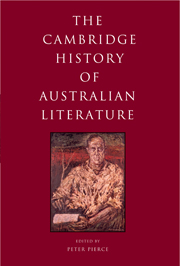Book contents
- Frontmatter
- Introduction
- FROM EUROPEAN IMAGININGS OF AUSTRALIA TO THE END OF THE COLONIAL PERIOD
- FROM THE LATE NINETEENTH CENTURY TO 1950
- 7 Australia’s Australia
- 8 The short story, 1890s to 1950
- 9 Australian drama, 1850–1950
- 10 ‘New words come tripping slowly’: Poetry, popular culture and modernity, 1890–1950
- 11 Australian fiction and the world republic of letters, 1890–1950
- 12 Australia’s England, 1880–1950
- TRAVERSES
- FROM 1950 TO NEARLY NOW
- Select bibliography
- Index
- References
11 - Australian fiction and the world republic of letters, 1890–1950
from FROM THE LATE NINETEENTH CENTURY TO 1950
Published online by Cambridge University Press: 28 May 2011
- Frontmatter
- Introduction
- FROM EUROPEAN IMAGININGS OF AUSTRALIA TO THE END OF THE COLONIAL PERIOD
- FROM THE LATE NINETEENTH CENTURY TO 1950
- 7 Australia’s Australia
- 8 The short story, 1890s to 1950
- 9 Australian drama, 1850–1950
- 10 ‘New words come tripping slowly’: Poetry, popular culture and modernity, 1890–1950
- 11 Australian fiction and the world republic of letters, 1890–1950
- 12 Australia’s England, 1880–1950
- TRAVERSES
- FROM 1950 TO NEARLY NOW
- Select bibliography
- Index
- References
Summary
Lacking much that cosmopolitan sophisticates draw upon, the Australian has nevertheless had to compete with the world.
Miles Franklin, Laughter Not for a Cage, p. 214.In London in June 1935, two Australian writers met on a train bound for Paris. Christina Stead, then 32, had only just moved back to London from Paris, where she and her partner William Blake had lived since 1929. Nettie Palmer, then 52, was struck by the younger woman’s worldliness: in her diary, she described Stead as ‘assured, perfectly dressed, tailored and supple’, and found no trace of an Australian accent in her ‘nodding sing-song voice’. For her part, Stead described Palmer as a ‘good-natured, school-teacherish woman, totally without flair or imagination’.
Stead and Palmer were travelling together as Australian representatives to the International Congress of Writers for the Defence of Culture, a mass meeting of intellectuals against fascism held in Paris in June 1935. They spent a good deal of time together during the five days of the congress but did not warm to each other. They were two very different types of Australian writer. Though fluent in French and German and widely read in European and American literatures, Nettie and her husband Vance were energetically promoting the idea of a distinctively national Australian literary culture. Her landmark book, Modern Australian Literature, had appeared in 1924.
- Type
- Chapter
- Information
- The Cambridge History of Australian Literature , pp. 223 - 254Publisher: Cambridge University PressPrint publication year: 2009
References
- 4
- Cited by



